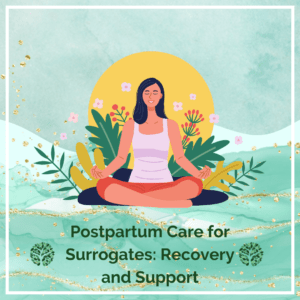
The surrogacy journey doesn’t end at delivery. After carrying a baby for nine months and helping intended parents realize their dreams of parenthood, surrogates enter the postpartum phase, which brings unique physical and emotional challenges. Proper postpartum care is crucial for a smooth recovery and emotional well-being. Below is a guide to help surrogates navigate this important phase of healing and support.
1. Physical Recovery After Delivery
No matter how you delivered—whether vaginally or via cesarean section—your body needs time to heal. The postpartum recovery process varies depending on your delivery method:
- Vaginal Delivery: The recovery period following a vaginal birth typically lasts about 6-8 weeks. During this time, you may experience vaginal bleeding (lochia), perineal soreness, and possibly stitches if you had any tearing or an episiotomy. Be gentle with yourself and avoid heavy lifting or intense physical activity to allow your body to heal. Your doctor will likely recommend light activity, such as walking, to aid circulation and prevent complications like blood clots.
- C-section Recovery: A cesarean section involves major abdominal surgery, so the recovery period may last 8 weeks or longer. You’ll need to be especially careful with your incision site to avoid infections. Pain management, light movement, and avoiding heavy lifting are key to a smooth recovery. Always follow your doctor’s guidelines on when it’s safe to resume daily activities and exercise.
Regardless of the method of delivery, proper rest, staying hydrated, and eating nutrient-rich foods can speed up your recovery. Taking the time to care for yourself physically will help ensure a faster and smoother healing process.
2. Navigating Postpartum Emotions
The postpartum period can be emotionally complex for surrogates. After giving birth, hormonal changes may lead to the “baby blues,” which include mood swings, anxiety, and mild depression. While these feelings are temporary, surrogates often face additional emotions related to the unique nature of their journey. Even though surrogates do not expect to parent the child, they may still feel a sense of loss after giving birth, as carrying the baby for nine months fosters a deep connection.
- Support Networks: Emotional support is key during this time. Reach out to friends, family members, or a therapist if you’re feeling overwhelmed. Many surrogates find comfort in joining surrogacy support groups, where they can talk to others who understand their experience. Simply sharing your feelings can be a great relief.
- Postpartum Depression: While the baby blues are common, more severe or prolonged feelings of sadness or hopelessness may indicate postpartum depression (PPD). If you experience these symptoms for more than two weeks, or if they intensify, seek help from a healthcare provider. Therapy, medication, or a combination of both can be effective treatments for PPD.
3. Maintaining a Relationship with Intended Parents
Your relationship with the intended parents doesn’t necessarily end after the birth of the baby. Some surrogates maintain an ongoing relationship, while others prefer more distance. Whatever the case, it’s important to establish clear communication around post-birth contact. Discuss your expectations with the intended parents before delivery so everyone is on the same page about how often you’ll communicate and what type of contact you’ll have.
If you feel that staying in touch will aid your emotional recovery, communicate this with the intended parents. However, if you need space to focus on your own healing, don’t hesitate to voice those feelings as well. Boundaries and mutual respect will help ensure that everyone feels comfortable with the arrangement.
4. Practical Self-Care Tips
Postpartum recovery isn’t just about emotional well-being—it also involves practical care to ensure your body heals properly. Here are some essential self-care tips for surrogates during the postpartum period:
- Get Plenty of Rest: After giving birth, your body needs time to recover. Sleep whenever you can, and don’t hesitate to ask for help from family and friends with household chores or caring for other children.
- Eat Nutritious Foods: A healthy diet is essential for postpartum recovery. Focus on eating foods rich in vitamins, minerals, and protein to give your body the nutrients it needs to heal. Drink plenty of water, as hydration helps speed up recovery.
- Gentle Movement: Light exercise, such as walking, can help improve circulation and lift your mood. However, it’s important to avoid strenuous physical activity until your healthcare provider gives you the green light.
- Pamper Yourself: Set aside time for self-care, whether that means taking a warm bath, practicing meditation, or simply resting with a good book. Prioritizing your mental and physical health will help you feel more balanced and capable of handling the challenges of postpartum recovery.
5. Seek Professional Help When Needed
While the postpartum period typically resolves within a few months, some surrogates may experience longer-term emotional or physical challenges. If you feel like your recovery isn’t progressing as expected or if you’re experiencing persistent physical pain, don’t hesitate to reach out to your healthcare provider.
Emotionally, if you’re struggling to process the end of your surrogacy journey, a therapist who specializes in postpartum care or surrogacy support may be able to help. Talking through your feelings with a professional can provide the guidance and reassurance you need during this transition.
Conclusion
Postpartum care for surrogates is about healing both physically and emotionally. By focusing on recovery, seeking emotional support, maintaining communication with the intended parents, and practicing self-care, you can navigate the postpartum period with strength and resilience. Remember, this part of the journey is equally as important as the pregnancy itself, and taking time to care for your well-being will help ensure a smooth and fulfilling conclusion to your surrogacy experience.
